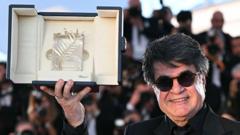Iran has reacted strongly to comments made by French foreign minister Jean-Noël Barrot, following the Cannes Film Festival triumph of Iranian director Jafar Panahi, who won the prestigious Palme d'Or for his film "It Was Just an Accident." This film, highlighting political themes grounded in Panahi's experiences with the Iranian authorities, received accolades on a global platform, but prompted controversy when Barrot described his win as "a gesture of resistance against the Iranian regime's oppression."
In response to these remarks, Iran's foreign ministry spokesperson, Mohammad Tanhaei, summoned the French envoy in Tehran, terming Barrot's statements as "insulting" and "unfounded." The Iranian official criticized the comments as egregious interference in domestic matters, labeling them as "irresponsible and provocative." Tanhaei also pointed out France’s lack of moral standing to comment on Iran's situation, referencing France's own foreign policy failures, particularly regarding the plight of Palestinians in Gaza. He insisted that an official explanation from the French government was necessary, which the envoy pledged to communicate.
Panahi’s journey as a filmmaker has been tumultuous; he has faced imprisonment due to his bold critiques of the state and has endured restrictions on his ability to create and travel. His recent work, created secretly in Iran, tells the story of fellow prisoners confronting their abuser, drawing from his real-life conversations with them. During his powerful acceptance speech at Cannes, Panahi rallied his fellow citizens to fight against oppression, proclaiming the need for personal freedoms in Iran. After such a significant international accolade, he expressed his intentions to return to Iran and ponder his future projects, adhering to his lifelong commitment to storytelling despite the adversities he has faced.
In response to these remarks, Iran's foreign ministry spokesperson, Mohammad Tanhaei, summoned the French envoy in Tehran, terming Barrot's statements as "insulting" and "unfounded." The Iranian official criticized the comments as egregious interference in domestic matters, labeling them as "irresponsible and provocative." Tanhaei also pointed out France’s lack of moral standing to comment on Iran's situation, referencing France's own foreign policy failures, particularly regarding the plight of Palestinians in Gaza. He insisted that an official explanation from the French government was necessary, which the envoy pledged to communicate.
Panahi’s journey as a filmmaker has been tumultuous; he has faced imprisonment due to his bold critiques of the state and has endured restrictions on his ability to create and travel. His recent work, created secretly in Iran, tells the story of fellow prisoners confronting their abuser, drawing from his real-life conversations with them. During his powerful acceptance speech at Cannes, Panahi rallied his fellow citizens to fight against oppression, proclaiming the need for personal freedoms in Iran. After such a significant international accolade, he expressed his intentions to return to Iran and ponder his future projects, adhering to his lifelong commitment to storytelling despite the adversities he has faced.





















